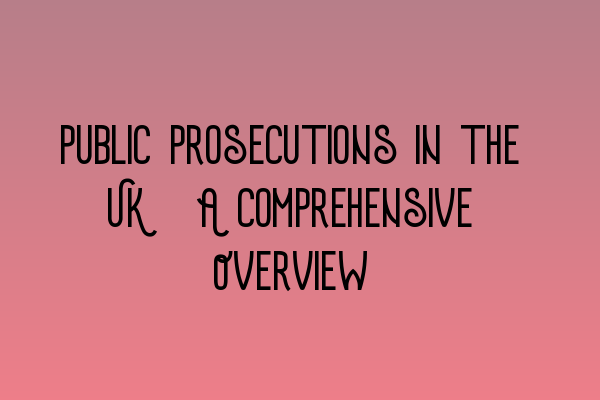Public Prosecutions in the UK: A Comprehensive Overview
Welcome to SQE Criminal Law & Practice Law UK! In this blog post, we will provide you with a comprehensive overview of public prosecutions in the UK. Whether you are a law student preparing for the SQE exams or a practicing solicitor looking to refresh your knowledge, this article will cover all the essential aspects of public prosecutions to help you understand this complex area of law.
What is a Public Prosecution?
A public prosecution refers to the legal process where the government, through specialized agencies such as the Crown Prosecution Service (CPS), brings criminal charges against individuals or organizations accused of committing a crime. The primary objective of public prosecutions is to protect the public, maintain law and order, and ensure justice is served.
The Role of the Crown Prosecution Service (CPS)
The Crown Prosecution Service (CPS) is responsible for conducting public prosecutions in England and Wales. As an independent body, the CPS is tasked with assessing the evidence gathered by the police and other investigative agencies and determining whether there is enough basis to proceed with criminal charges. They also represent the prosecution in court and work closely with the police throughout the investigation and trial processes.
If you’re interested in learning more about the Crown Prosecution Service and its functions, you can check out our SQE 1 Practice Exam Questions article.
Stages of a Public Prosecution
A public prosecution typically involves several stages, each essential to ensure a fair and just legal process. These stages include:
- Investigation: The police and other investigative agencies gather evidence and evaluate the circumstances surrounding the alleged crime.
- Charging Decision: The CPS reviews the evidence and determines whether there is sufficient evidence to charge the accused with a crime.
- Pre-Trial Preparations: The prosecution and defense exchange evidence and prepare their respective cases.
- Trial: The case is presented in court, where the prosecution presents evidence, examines witnesses, and argues their case.
- Verdict and Sentencing: If the accused is found guilty, a sentence is imposed based on the severity of the offense and any relevant sentencing guidelines.
Key Players in a Public Prosecution
In addition to the Crown Prosecution Service, there are other key players involved in a public prosecution:
- Judge: The judge presides over the trial, ensures fairness, and applies the law.
- Defense Counsel: The defense counsel represents the accused and presents their case to challenge the prosecution’s evidence.
- Witnesses: Witnesses play a crucial role in providing testimony and evidence relevant to the case.
Preparing for a Career in Public Prosecutions
Aspiring solicitors interested in specializing in public prosecutions should focus on developing a strong understanding of criminal law and procedure. Taking comprehensive SQE 2 Preparation Courses and honing advocacy skills will greatly enhance your chances of success in this field.
If you’re currently preparing for the SQE exams, our SQE 1 Preparation Courses can help you master the foundational principles of criminal law and procedure.
Stay Updated with SRA SQE Exam Dates
For law students and aspiring solicitors, it’s crucial to stay informed about upcoming exam dates. The SRA SQE Exam Dates article on our website provides you with the latest information on exam dates, registration deadlines, and other important details. Don’t miss out on any key dates – stay updated!
If you want to test your knowledge and prepare yourself for the SQE exams, our SQE 1 Practice Mocks FLK1 FLK2 can be an excellent resource.
We hope you found this comprehensive overview of public prosecutions in the UK helpful. If you have any further questions or need assistance with your SQE exam preparations, please do not hesitate to contact SQE Criminal Law & Practice Law UK!
